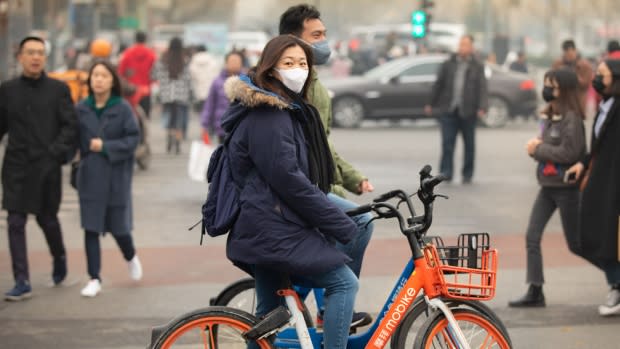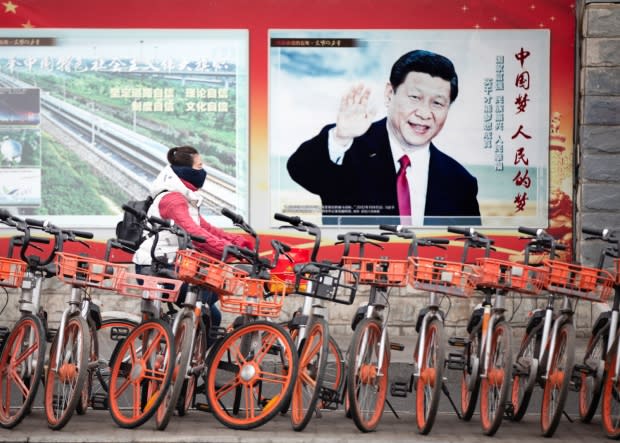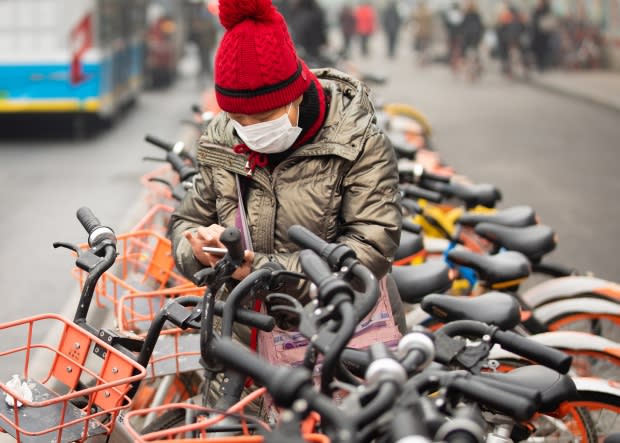GPS bike-share program in China credited with reducing gridlock and smog
The smog hangs thick over Beijing. It's a brownish haze with a vaguely smoky smell, shrouding lanes of traffic and pedestrians wearing face masks.
The main culprits are nearby steel factories and coal-burning heating plants. But the city's five million cars add much to the toxic mix, creating air that's frequently rated "hazardous" by the World Air Quality Index Project.
"Traffic jams don't just block the streets," said one woman named Li. "They block the air."
Now a partial solution may be riding to the rescue on two wheels.
Since the beginning of last year, Chinese cities have been awash with 23 million GPS-equipped bicycles, part of a bike share program that has been credited with changing traffic patterns across the country and reviving a mode of transportation that was fading fast.
Research by the China Institute of Information and Communications Technology (CIICT) revealed that on one day last year, the system logged 70 million riders — three to four rides per bike.
According to mapping industry studies here, the program has reduced inner-city car trips by 7.4 per cent in some areas and 3.8 per cent of total car trips in these cities.
"For years, we thought the way to cut traffic congestion in Beijing was to build more roads and parking lots," said Zhao Yixin, a planner with the Urban Transportation Institute who advises the city government. "We learned that doesn't work. There's always more cars and more traffic."
"But these bicycles are actually having an impact," he said.
'Convenient' and 'good for the environment'
This isn't the first bike sharing project in China. Several years ago, it introduced a variety of dock-based systems, which were rarely used. There weren't enough bikes or docks, and in cities with upwards of 10 million people, the docks were rarely in places people needed them most.

By the time this latest system was introduced, bike ridership in Beijing (which has 22 million people) was at an all-time low and dropping.
This, in a city where bikes ruled just a few decades ago.
The new, technologically driven system was pioneered by students at Peking University looking for a cheap and convenient way of getting around. They wanted one that allows users to mix public transit and bikes, even opening up the city's maze of hutongs, the narrow back alleys of Beijing's traditional neighbourhoods.
Unlike common bike share programs in Western cities, this new Chinese system doesn't use docking stations. Instead, the bikes can be picked up and dropped off pretty much anywhere — from subway stops to office buildings to the rider's front door.
A phone app scans the bike's bar code and a signal releases the lock remotely. Each bike has a GPS tracker, so companies know where every rider goes. The standard cost is about 20 cents an hour.
Riders lining up to pick up the colourful bikes outside Beijing's Dongdaqiao station say the main draw is exactly what those original students intended.
"The bikes are cheap and they are everywhere," said one young man. "So I didn't have to buy one myself."
"It's convenient for me and good for the environment," said a woman through her face mask.

One of the major shared bike companies, Didi Chuxing, said its marketing surveys show that helping the environment is a big motivation for users. That's especially true among those under 30, who make up half the ridership for shared bikes, said Fu Qiang, the company's senior vice-president.
"People in China are worried about the air and their living conditions, and they are more and more willing to make an effort to improve the environment," he said.
According to CIICT research, this bike share program reduced carbon dioxide emissions by about four million tonnes last year. That would be the equivalent of taking more than 900,000 cars off the road.
Smaller-scale studies done on local bike share programs in North American and European cities have suggested similar benefits, but none on this scale.

Some growing pains
The GPS-based technology is now spreading to other parts of the world, like the U.S. and Britain. It's expected to be widely available in Canada within the next several years.
But there have been growing pains. Some in China have called the bike phenomenon nothing less than an "invasion" and a "plague."
The convenience of leaving the bikes anywhere means they are left everywhere -- on people's doorsteps, in front of entranceways and in the middle of the road.
Two hundred Chinese cities have struggled to make room for the machines and bring order to the chaos on their sidewalks. As competing companies flood the market with their bikes, pedestrians frequently need to pick their way around rows or mounds of thousands of tightly packed bicycles.
Some cities have responded by literally bulldozing them out of the way and into landfill sites. Pictures and videos of huge mounds of colourful bikes have sparked heated discussion online in China.

The cities of Shanghai and Beijing have tightened rules about where the bikes can be left, making the companies responsible for redistributing them every day, or giving riders incentives to leave the bikes in a more orderly way in designated spots.
There have been problems on the roads as well. As recently as the 1980s, Beijing was a city with broad side streets famously dedicated to bicycle traffic. But over time, these have been taken over by cars, forcing bikes to weave dangerously through the gridlock.
"We need to reclaim these spaces," said city planner Zhao, who suggested removing cars that park everywhere and routinely use lanes designed for two wheels, not four.
He says Beijing intends to block off entire roads just for bicycles all over again. Didi Chuxing, the bike sharing company, has recommended special bike signs for traffic lights at major intersections.
There are limitations to how far this can go. In China, as in most places, bikes are most useful for short distances and in relatively good weather. Flat cities like Beijing have an advantage.
Still, experts like Zhao consider China's experience "inspiring" and a welcome surprise in the way technology has changed how people use old, familiar green vehicles to displace the environmentally unfriendly car.


